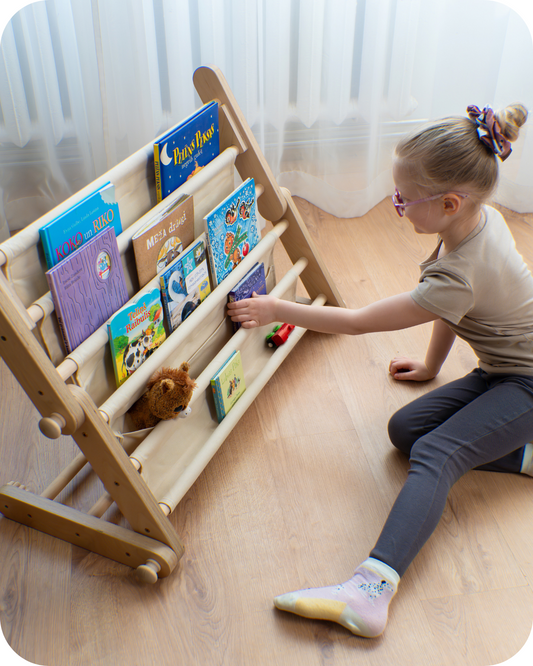Parenting is a remarkable journey filled with love, joy, and the desire to provide the best for our little ones. As parents, we all strive to raise confident, happy, and well-rounded children. One approach that has gained increasing popularity is respectful parenting, inspired by the philosophies of Emmi Pikler and Maria Montessori.
In this article, we will explore what respectful parenting truly means, debunk some misconceptions, and offer practical tips for incorporating respectful practices into your everyday parenting routine.
What is Respectful Parenting?
At its core, respectful parenting is a philosophy that acknowledges and values the autonomy, individuality, and natural development of each child. It fosters a deep respect for the child's abilities, preferences, and emotions, while providing a nurturing environment that supports their growth and independence.

What is NOT Respectful Parenting
Before delving into the principles of respectful parenting, it's essential to dispel some common misconceptions. Respectful parenting is not about letting children do whatever they want without any guidance or boundaries.
It does not mean relinquishing your role as a parent or sacrificing structure and discipline. Instead, it is a balanced approach that promotes healthy parent-child relationships built on trust, empathy, and open communication.

Practical Tips for Incorporating Respectful Parenting
1. Create a Safe and Stimulating Environment:
- Set up a designated play area where your child can explore freely and safely. Include age-appropriate toys, puzzles, and art supplies that encourage creativity and problem-solving.
- Choose furniture like low shelves or tables that allow easy access for your child, promoting their independence in selecting and putting away toys.
- Create a calm and inviting space for rest and quiet time, with soft cushions or a cozy reading corner.
2. Foster Open Communication:
- Set aside dedicated moments each day to engage in one-on-one conversations with your child. Ask open-ended questions and actively listen to their responses without judgment.
- Use descriptive language to help your child label and express their emotions. For example, "I can see you're feeling frustrated because you can't reach the toy. Let's find a solution together."
- Teach your child simple sign language or gestures to enhance their communication skills before they can express themselves verbally.
3. Set Clear and Consistent Boundaries:
- Involve your child in creating family rules or guidelines, allowing them to have a sense of ownership and understanding. Keep the rules simple and specific to their age and developmental stage.
- Use positive language when establishing boundaries. Instead of saying, "Don't run inside," say, "Let's use our walking feet inside to keep ourselves safe."
- Provide gentle reminders and reinforce the boundaries consistently. Use redirection and distraction techniques when necessary.
4. Nurture Independence:
- Encourage your child to participate in daily routines, such as dressing themselves, brushing their teeth, or picking out their clothes. Offer choices within limits to promote decision-making skills.
- Allow your child to help with age-appropriate chores, such as setting the table or watering plants. Appreciate their efforts and provide guidance when needed.
- Give your child the opportunity to solve simple problems on their own before stepping in to assist. This builds their confidence and problem-solving abilities.
5. Practice Positive Discipline:
- Instead of time-outs or punishments, use positive discipline techniques like natural consequences. For example, if your child refuses to eat their dinner, they may feel hungry until the next mealtime.
- Use redirection and distraction to guide your child away from inappropriate behavior. Offer alternative choices or activities that align with their interests.
- Model and teach empathy by discussing the impact of actions on others. Encourage your child to consider the feelings of their siblings or friends when resolving conflicts.

By taking these initial steps, you can begin to weave respectful parenting principles into your everyday interactions with your child. Remember, it's a gradual process, and it's essential to be patient with yourself and your child as you navigate this parenting approach.
And what to do in those hard moments?
Tantrums and displays of anger are a normal part of a toddler's development. Rather than viewing them as misbehavior, respectful parenting approaches these situations with empathy and understanding. Here are some suggestions to help you navigate tantrums and anger in a respectful manner:
- Stay Calm and Patient: When your toddler has a tantrum or displays anger, it's crucial to remain calm and composed. Take deep breaths and remember that their emotions are valid, even if their behavior is challenging.
- Validate Their Feelings: Show empathy towards your toddler's emotions by acknowledging their feelings. Use phrases like, "I see that you're upset" or "It's okay to feel angry." This validation helps them understand that their emotions are recognized and accepted.
- Provide a Safe Space: Create a designated calm-down area in your home where your toddler can retreat when they're upset. Fill it with soft cushions, books, or comforting objects. Encourage them to use this space to regulate their emotions.
- Offer Choices: During moments of anger or frustration, offer your toddler simple choices to help them regain a sense of control. For example, ask if they would like a hug or a quiet moment alone, or if they would prefer a specific comfort item.
- Use Reflective Listening: Engage in reflective listening by paraphrasing and summarizing your toddler's feelings. For example, say, "You're really upset because you wanted to keep playing," or "I understand that you're mad because you can't have the toy right now."
- Avoid Punishments or Rewards: Respectful parenting encourages a non-punitive approach, even during challenging moments. Avoid using punishments or rewards to manipulate your child's behavior during tantrums or anger. Instead, focus on understanding and supporting their emotions.
- Teach Emotional Regulation:Help your toddler develop healthy coping mechanisms by teaching them simple techniques for emotional regulation. Encourage deep breaths, counting to ten, or squeezing a stress ball. Model and practice these techniques together.
- Engage in Problem-Solving: When your toddler is calm and ready, engage in problem-solving conversations. Ask open-ended questions like, "What could we do differently next time?" or "How can we solve this problem together?" This helps them develop critical thinking and conflict resolution skills.
Daily things toddlers can do to gain independance
Toddlers (1-2 years old):
- Self-Feeding: Encourage your toddler to feed themselves using child-sized utensils. Offer foods that are easy to handle, such as small pieces of fruit or cooked vegetables. Allow them to explore different textures and tastes independently.
- Dressing Themselves: Provide clothing with simple closures like elastic waistbands or Velcro fasteners, making it easier for your toddler to practice dressing themselves. Start with simple items like socks or hats and gradually introduce more complex clothing items like shirts or pants.
- Self-Care Skills: Teach your toddler basic self-care skills like washing their hands with supervision, wiping their face with a cloth, or brushing their teeth with assistance. Offer child-friendly tools and demonstrate the steps in a fun and interactive way.

Older Toddlers (3-4 years old):
- Simple Chores: Involve your toddler in age-appropriate chores such as putting away toys, helping with tidying up, or setting the table. Provide clear instructions and break tasks down into smaller steps, offering praise and encouragement for their efforts.
- Independent Dressing: Encourage your toddler to choose their own clothes and dress themselves. Arrange their clothes in an accessible way, with low hooks or drawers they can easily reach. Offer guidance when needed, but allow them to take the lead.
- Basic Meal Preparation: Engage your toddler in simple meal preparation tasks like washing fruits and vegetables, stirring ingredients, or assembling sandwiches. Teach them about basic kitchen safety and gradually introduce more complex tasks as they grow in confidence.

Preschoolers (4-5 years old):
- Making Choices: Encourage your preschooler to make age-appropriate choices throughout the day. This can include selecting their own snacks, choosing which books to read at bedtime, or deciding which activities to pursue during playtime.
- Organizing Belongings: Help your preschooler develop organizational skills by involving them in sorting and arranging their toys, books, or clothes. Provide labeled bins or shelves, allowing them to take ownership of their personal space and belongings.
- Self-Help Skills: Teach your preschooler essential self-help skills such as using the restroom independently, washing their hands without assistance, or pouring drinks from a small pitcher. Provide step-by-step guidance and gradually allow them to take on more responsibility.

Conclusion
Respectful parenting offers a nurturing approach that fosters healthy parent-child relationships, promotes independence, and respects the unique qualities of each child. By creating a safe and stimulating environment, fostering open communication, setting clear boundaries, nurturing independence, practicing positive discipline, and embracing freedom of movement, you can embark on a parenting journey that prioritizes respect, empathy, and the holistic development of your child.
Remember, every parent and child are unique, so adapt these principles to suit your family's needs and values. Embrace the joys and challenges of parenting with love and respect, and watch your child thrive.






